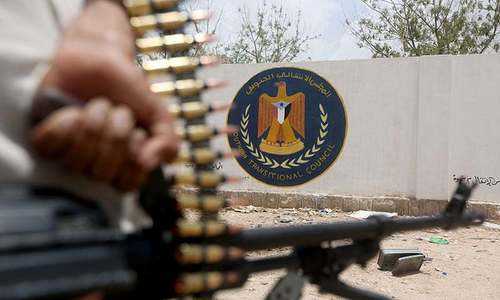
ADEN: Yemen’s internationally recognised government returned to the war-torn country on Monday for the first time since it was forced out by southern separatists during clashes last summer.
Prime Minister Maeen Abdulmalik Saeed landed in Aden, fulfilling a key point in the power-sharing deal brokered by Saudi Arabia that ended months of infighting with separatists in Yemen’s south.
The government’s priorities in the next stage are to normalise the situation in Aden first and then consolidate state institutions on the ground ... as a guarantor of stability, Saeed said when he disembarked onto the tarmac.
He described the government’s return as foundational for the improvement of civic services, but added that security challenges cannot be overlooked, especially at this stage.
Saeed, accompanied by five key ministers from President Abed Rabbo Mansour Hadi’s government, was received by local officials and Saudi forces at the air base.
“Today we are uniting our efforts to defeat the Iranian project in Yemen and restore the state,” the government said in a statement.
In August, the separatists, backed by the United Arab Emirates, overran Aden and drove out forces loyal to President Hadi, who has been based in Saudi Arabia since 2015.
The outbreak of violence between nominal partners in the Saudi-led coalition’s war against Iran-allied Houthi rebels added a new twist to the country’s complex civil war that had further dimmed hopes of an international solution to the conflict.
Hadi’s ministers were expected to return last Tuesday. But officials blamed southern secessionists for delaying the deal’s implementation and refusing to hand over the city headquarters and presidential palace.
The power-sharing deal, signed earlier this month in Saudi Arabia’s capital of Riyadh, calls for both sides to pull their forces out of Aden. That leaves the city under the coalition’s control, with only a presidential guard for Hadi’s protection if the exiled president were to return.
The agreement also asks that the separatists break up their militias and integrate them into Hadi’s forces.
“The plan for incorporating the security services needs to be clear and transparent,” Saeed said. “We have the support of the Saudis and the coalition leaders, factors that will help to implement the agreement through promising steps on the ground,” he added.
The war has killed over 100,000 people, displaced millions and pushed the country to the brink of major famine.
Published in Dawn, November 19th, 2019










































Dear visitor, the comments section is undergoing an overhaul and will return soon.